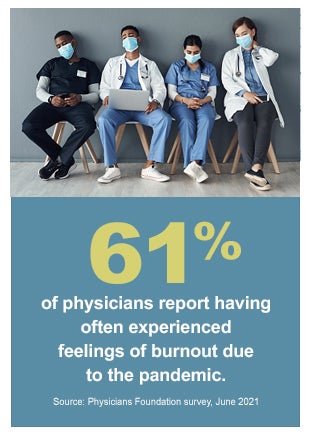

How to Help Clinicians Cope with the Pandemic’s Impact

COVID-19 continues to have a profound impact on health care’s workforce. A Physicians Foundation survey published this summer found that 61% of practitioners report having often experienced feelings of burnout due to the pandemic — a sharp increase compared with the organization’s 2018 data.
Elsewhere, many nurses are leaving hospital settings or the field entirely due to the demands of treating COVID-19 patients, according to a recent American Association of Critical Care Nurses survey. Two-thirds of the 6,000 acute and critical care nurse respondents say the pandemic has led them to consider leaving the field, while 92% believe the pandemic has depleted nurses at their hospitals and that because of this, their careers will be shorter than they had planned.
Provide Compassionate, Holistic Support
Concern about clinician well-being has been top of mind for years, but the pandemic has exacerbated stress and trauma and presented a unique opportunity to reframe core approaches to fostering a thriving workforce. The AHA’s 2022 Health Care Talent Scan provides insights on how health care executives can ensure that clinicians receive compassionate, holistic support so that they feel safe, valued and engaged.
 Helping clinicians cope with the barrage of emotional health challenges they’ve experienced will take time and leaders should be aware of signs of persistent trauma — a decline in performance, increased irritability or incivility or poor self-grooming — and provide support to aid in their recovery.
Helping clinicians cope with the barrage of emotional health challenges they’ve experienced will take time and leaders should be aware of signs of persistent trauma — a decline in performance, increased irritability or incivility or poor self-grooming — and provide support to aid in their recovery.
Compassionate understanding, allowing ample time for staff to work through their emotions and supportive services all play key roles in helping clinicians process trauma and grief so that they can move forward with energy and confidence. Here are some ways leaders can facilitate a healthier environment for staff as the pandemic persists.
5 Ways to Think Innovatively, Act Intentionally
Normalize help-seeking behavior.
Cheers for front-line clinicians are great, but concrete benefits are even better. Provide insurance coverage and access to independent mental health providers trained in trauma-informed care to help remove the stigma and barriers to using mental health services when needed. Reinforce that seeking help indicates strength, not weakness.
Nurture resilience through trauma-informed leadership.
SAMHSA (Substance Abuse and Mental Health Services Administration) describes a trauma-informed approach to facilitating healing through the development of interventions specifically designed to address the consequences of trauma. Trauma-informed leadership can help clinical leaders empathize with and support staff traumatized by COVID-19 or other causes. By recognizing and honoring clinicians’ emotional scars, leaders can help them process the experience, grow from it and emerge more resilient.
Provide psychological as well as physical PPE.
Psychological personal protective equipment (PPE) comprises the practices and routines that protect and nurture clinician resilience. These could include taking a day off, seeking mental health support or reframing negative experiences. Clinicians can tailor the psychological PPE to their individual needs and regularly integrate it into their work with the support of their leaders and organizations.
Empower clinicians to advocate for themselves.
Encourage clinicians to speak up about stressors they face and concerns about either their own health or that of their patients. Strengthen protections for reporting concerns without retribution, such as providing anonymous reporting mechanisms. Ensure that your leaders respond transparently and proactively to issues raised. Provide both formal and informal opportunities for ongoing peer support.
Invest in innovative support initiatives.
Hospitals and health systems across the country have supported their health care teams during the pandemic and beyond, often partnering in myriad ways with local universities or mental health organizations. These include providing peer-to-peer support groups, chat and text lines, chair massages, virtual yoga, mindfulness classes and compassion-resilience toolkits with discussion materials, blogs and video clips.
Learn more.
The AHA Clinician Well-being Playbook v2.0 provides additional resources for hospitals and health systems seeking to improve workforce resiliency. Additional resources are available on the AHA workforce home page.



